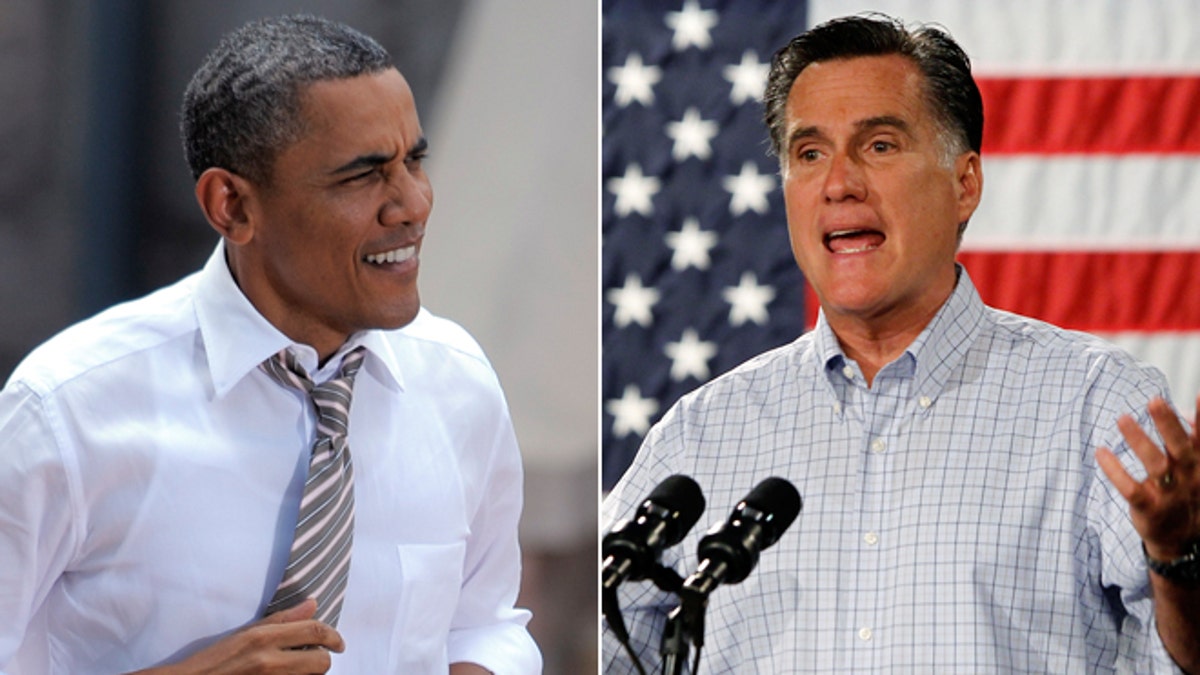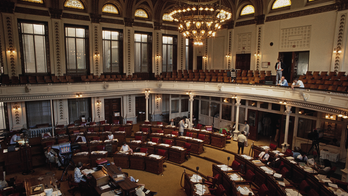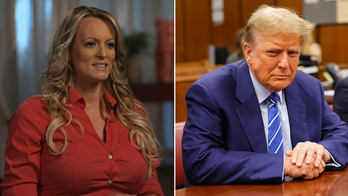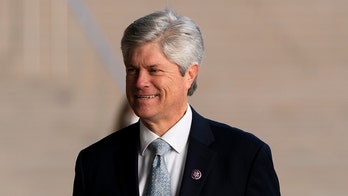
President Obama leads Mitt Romney by 9 percentage points in the latest Fox News poll. (AP)
– Yes, they’re scripted.
Yes, they’re largely pep rallies.
But presidential national conventions carry high stakes. Consider this: the nomination acceptance speeches by Barack Obama and his GOP challenger, Sen. John McCain, at the 2008 conventions each drew about 40 million viewers.
They’re engineered to build up to the apex when their party’s presidential nominee has his moment in the limelight – and comes out a star, or falls flat.
This year, both parties are planning to use their conventions to appeal to Latino voters, who may well help decide the next president if a significant number of the 21 million of them who are eligible to vote cast their ballots.
Both conventions are placing Latinos in featured speaking roles. They’ll also have a plethora of Latino events – some organized by the convention staffs and political party committees, others by private organizations.
You cannot make inroads with Latinos just by having faces, I think that it’s important to show that the party is open to Hispanics, but that’s not enough.
“I see evidence this year of progress in terms of inclusion of Latinos in the political debate,” said Mickey Ibarra, who was former director of White House intergovernmental affairs under the Clinton Administration, and who has attended every Democratic convention since 1984. “There’s no longer a debate about the importance of the Latino voter. The argument that it is critical is now largely complete.”
Republicans will head into the convention in Tampa the week of August 27 with the task of turning around the perception many Latinos have of Republicans as a party that often seems indifferent to them, at best, and hostile to them, at worst.
And so, this year’s Republican National Convention will be the most Latino-centric convention in the party’s history – featuring at least 10 Latino-themed events and several of the nation’s most prominent Latino Republican political leaders scheduled to deliver primetime speeches.
The stepped up Latino presence will mark a dramatic departure from the 2008 Republican convention, which was criticized for its lack of diversity. More than 90 percent of the delegates were non-Hispanic white, according to published reports.
“With Latinos, Republicans have a lot more ground to make up,” said Calvin Jillson, a political science professor at Southern Methodist University in Dallas, and an expert on political conventions. “They’ve got to make up a lot of ground if they are to remain a competitive political party – the Anglo base is shrinking.”
Democrats go into their convention – which will take place in Charlotte, North Carolina the week of Labor Day -- knowing they enjoy a historical advantage with Latinos, who tend to vote for the Democratic candidate and in 2008 gave nearly 70 percent of their vote to Barack Obama.
They recently announced with much fanfare that this year’s convention would feature the DNC first Latino keynote speaker – San Antonio Mayor Julian Castro, considered a possible future presidential contender.
And the chairman of the convention is Los Angeles Mayor Antonio Villaraigosa. There will also be numerous Latino events, as well as nearly 800 Latino delegates, which could be a record.
But the GOP isn’t alone in facing the challenge of a leery Latino electorate.
President Obama and his party have their work cut out for them between now and Election Day, which falls on Nov. 6.
Latinos have an unemployment rate of 10.3 percent, higher than the general rate of 8.3 percent.
Republicans, who generally avoided the subject of the economy at the 2008 convention, while the Democrats seized on it, this time will focus on it as a weapon against the Obama campaign.
“We’re in a very different position, as opposed to four years ago, when [President Obama] laid out a vision on where to take America and engendered a whole lot of hope and optimism,” said Ibarra, the former director of White House intergovernmental affairs under the Clinton administration. “Now he has to defend a record of four years. It’s a very different argument he’ll be making when the economy continues to recover at a much slower pace than he and others would like.”
The GOP campaign message to Latinos has mirrored the one for the general public – concentrated on how, they say, the Obama administration’s failed economic policies have made life more difficult for Latinos and other Americans.
The Democratic convention will attempt to portray Romney’s economic policies as favoring the rich.
“The President will lay out his vision for an economy built to last where, no matter where you come from, if you work hard and act responsibly you have a shot at the American Dream,” said Gabriela Domenzain, Hispanic Press director for the Obama campaign.
The convention, she said, “will highlight the choice in this election between to fundamentally different visions of how to grow the economy; one which strengthens the majority of Hispanic families by growing the economy from the middle-class out, and one backed by the Romney/Ryan ticket which embraces the same failed economic policies that brought our economy to the brink of collapse and disproportionately hurt Hispanic families.”
Will the disillusionment among Latinos who supported Obama in 2008 keep them home on Election Day?
“The primary challenge for the Obama campaign will be exciting Latinos enough to turn out to vote,” Ibarra said.
“They could feel that neither party makes any difference, that neither candidate or party is really for us, they’re for themselves,” Ibarra said.
During the GOP primaries, Romney stood out for his particularly hard line on immigration.
He expressed support for tough enforcement of immigration laws, and firmly expressed opposition to virtually any policy or program that would give certain undocumented immigrants a chance to legalize their status.
Romney’s defenders say he must address the impression of himself among many Latinos that those hard-line positions equal a lack of regard for their community.
“We’re running behind on the Hispanic vote,” said Rachel Campos-Duffy , the wife of Wisconsin Rep. Sean Duffy and one of 15 women named to the “Women for Mitt” national advisory board. “The Hispanic voter can swing either way. The convention is an opportunity for the parties to introduce themselves. For Republicans, it’s important to introduce our philosophy.”
And to promote that philosophy, she says the party will strive to show Latinos that it embraces “entrepreneurship, our social values, free market system, and supports Hispanics who are hard-working so they can access the American Dream.”
More than 10 Hispanic groups, including the Hispanic Leadership Network, Libre, and the Latino Coalition, will host a variety of sidebar events throughout the week. This year’s convention speaker list features the most prominent Latino Republican politicians from key battleground states, including Nevada, Florida, and New Mexico.
The rising Texas congressman and Tea Party favorite Ted Cruz, as well as the Governor of Puerto Rico Luis Fortuno will speak on Monday night. His wife Luisa, will introduce Ann Romney that same night.
New Mexico Governor Susana Martinez will speak Tuesday night. Cuban-born Florida Senator Marco Rubio, who had been a serious contender for Romney’s vice presidential pick, will introduce the Republican nominee in primetime on Thursday night. Nevada Governor Brian Sandoval is also expected to deliver an address though it has not yet been confirmed by the RNC.
The Latino surrogates – how many will be at the GOP gathering is still unclear – will have a prominent role in shaping Romney’s image as all eyes turn to Tampa, but it’s the presumed Republican presidential nominee who will ultimately have to sell himself and his policies to the Latino community.
“You cannot make inroads with Latinos just by having faces, I think that it’s important to show that the party is open to Hispanics, but that’s not enough,” said Alfonso Aguilar, a former administration official under President George W. Bush and now executive director of the Latino Partnership for Conservative Values.
How much, if any, of Romney’s speech will be directed at Latinos remains to be seen. But critics of Romney’s immigration rhetoric during the primaries believe he has to talk about immigration to appease Latinos.
It is a hot potato topic that the RNC and the Romney campaign have tried to downplay, saying that Latinos care more about the economy.
“It’s really about going after Obama, turning the tables, and saying 'Look, this guy is not your friend – despite all of his rhetoric,'” Aguilar said. “He had an opportunity to push immigration reform and he didn’t, instead he’s separating families all over the country though deportation.”
Obama will be heading into this convention facing a Latino electorate that is disillusioned by the non-existence of comprehensive immigration reform – which Obama vowed in his 2008 campaign that he would push to bring about in his first 100 days in office.
Not only did he not deliver on that promise, his opponents frequently point out, Obama also presided over the highest number of deportations ever – roughly more than 1.1 million people in the last three years, most of them non-criminals.
The Obama campaign has sought to blame Republicans for the president’s lack of progress on finding a solution to illegal immigration.
Experts say that could be part of the reason the Romney camp picked Rubio – who has advocated for a softer GOP tone on immigration – to introduce the candidate in primetime. Often lauded for his oratory skills, Rubio has found a more nuanced way of talking about immigration from the Republican point of view, even proposing his own version of the DREAM Act for young undocumented immigrants.
Larry Sabato, the director for the Center for Politics at the University of Virginia, said: “Sen. Rubio has provided a way out for Romney – something the nominee can sell on immigration – if he’ll just take it and run with it.”
Rep. Mario Diaz Balart, a Florida Republican, believes the economy and Obama’s "You Didn’t Built That” comments – not immigration – will be the key in swaying voters such as Florida’s important Puerto Rican voters, who are already American citizens.
“I think Gov. Romney has a good chance of getting a good percentage of them…,” he said. “You want to see an example of what entrepreneurship and hard work and playing by the rules can lead to go to central Florida and look at what the Puerto Ricans have done there.”
He said Latinos in Florida are hard-working entrepreneurs who have suffered from high unemployment numbers compared to other parts of the country.
“I think Gov. Romney wins Florida and I don’t think it’s going to be as close as people think it is,” Diaz Balart said. “I don’t see how anybody can be satisfied with the economic situation.”
Follow Elizabeth Llorente on Twitter @Liz_Llorente and Bryan Llenas on Twitter @Bryan_Llenas for up to date information from the RNC and DNC.
Follow us on twitter.com/foxnewslatino
Like us at facebook.com/foxnewslatino




